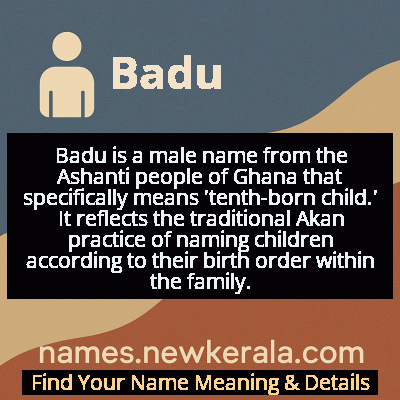Badu Name Meaning & Details
Origin, Popularity, Numerology Analysis & Name Meaning of Badu
Discover the origin, meaning, and cultural significance of the name BADU. Delve into its historical roots and explore the lasting impact it has had on communities and traditions.
Name
Badu
Gender
Male
Origin
African
Lucky Number
1
Meaning of the Name - Badu
Badu is a male name from the Ashanti people of Ghana that specifically means 'tenth-born child.' It reflects the traditional Akan practice of naming children according to their birth order within the family.
Badu - Complete Numerology Analysis
Your Numerology Number
Based on Pythagorean Numerology System
Ruling Planet
Sun
Positive Nature
Leaders, ambitious, highly driven, self-reliant, innovative.
Negative Traits
Overly aggressive, domineering, impatient, selfish.
Lucky Colours
Red, orange, gold.
Lucky Days
Sunday.
Lucky Stones
Ruby, garnet.
Harmony Numbers
2, 3, 9.
Best Suited Professions
Entrepreneurs, managers, engineers.
What People Like About You
Courage, determination, leadership.
Famous People Named Badu
Badu Bonsu II
Ashanti King
Led Ashanti resistance against Dutch colonial forces in early 19th century
Badu Akosa
Medical Doctor and Politician
Former Director-General of Ghana Health Service and public health reformer
Badu Nkansah
Educational Publisher
Pioneered educational publishing in Ghana through Badu Nkansah Publications
Badu Mensah
Business Executive
Prominent corporate leader and business strategist in Ghana
Name Variations & International Equivalents
Click on blue names to explore their detailed meanings. Gray names with will be available soon.
Cultural & Historical Significance
This naming practice demonstrates the sophisticated social organization of Akan society, where identity is intrinsically linked to one's position within the family structure and community hierarchy. The preservation of such names among diaspora communities worldwide serves as a powerful connection to cultural heritage and ancestral traditions. The name Badu embodies the Akan philosophical concept of family as a complete unit, with each member playing a distinct role in maintaining social harmony and continuity across generations.
Extended Personality Analysis
Individuals named Badu are traditionally believed to embody characteristics of completion, wisdom, and leadership. Being the tenth-born, they are often perceived as natural mediators and problem-solvers within family structures, having observed and learned from their nine older siblings. This position typically fosters traits of patience, diplomacy, and emotional intelligence, as they navigate complex family dynamics from birth. Many Badus are thought to possess a natural authority and organizational ability, making them effective leaders in both family and community settings.
Their birth order position often instills a sense of responsibility toward maintaining family harmony and traditions, while also bringing innovative perspectives as the 'final piece' of the family puzzle. These individuals are frequently described as balanced, thoughtful, and possessing the maturity that comes from being the youngest in a large sibling group. The cultural expectation is that Badus will serve as family historians and tradition-bearers, carrying forward the collective wisdom of their predecessors while adapting it to contemporary circumstances. This unique positioning often results in individuals who are both deeply rooted in tradition and forward-thinking in their approach to life's challenges.
Modern Usage & Popularity
In contemporary Ghanaian society and among the global diaspora, the name Badu maintains its cultural resonance while adapting to modern naming practices. While traditionally reserved strictly for tenth-born males, many parents now choose the name for its cultural significance and pleasant phonetics, regardless of actual birth order. The name has seen steady usage in urban centers like Accra and Kumasi, and enjoys particular popularity among families seeking to maintain strong connections to Akan heritage. Among Ghanaian communities in Europe and North America, Badu serves as an important cultural marker, helping preserve identity across generations. Though not among the most common Akan names internationally, it continues to be chosen by parents who value its deep cultural meaning and connection to traditional family structures.
Symbolic & Spiritual Meanings
Symbolically, Badu represents the completion of cycles and the concept of wholeness in Akan cosmology. The number ten carries profound significance, representing perfection and the fulfillment of natural orders - much like the ten lunar months of human gestation or the completion of numerical sequences. As the name for the tenth child, Badu embodies the idea that the last member completes the family unit, bringing balance and closure to the reproductive journey. This position symbolizes both an ending and a new beginning, suggesting that while the child may be the last born, they carry the responsibility of representing the entire family lineage forward. The name also metaphorically represents the accumulation of family wisdom and experience, positioning the tenth-born as the repository of collective knowledge gathered from all preceding siblings.

